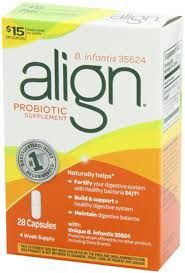 A new investigation is looking into allegations that Align probiotics products don’t provide the health benefits their makers claim they do.
A new investigation is looking into allegations that Align probiotics products don’t provide the health benefits their makers claim they do.
Since 2012, consumers who believe they were deceived by the labeling of Align products have been waging an Align probiotics class action lawsuit against Procter & Gamble, the makers of these products.
According to the plaintiffs, Procter & Gamble began marketing Align for retail sale in 2009. The company’s labeling for these products claims that they can “[b]uild & maintain a healthy digestive system,” “[r]estore your natural digestive balance,” and “[p]rotect against occasional digestive upsets.”
Though there are various definitions of the term “probiotic,” the term generally refers to bacteria that can be beneficial to human health.
Probiotics are frequently promoted as being beneficial to digestive health.
Procter & Gamble allegedly credits Align probiotics supposed effectiveness to Bifantis, a patented probiotic strain that purportedly “brings peace to your digestive system” and provides a “restored natural balance to your digestive system.”
Procter & Gamble says Bifantis was developed by gastroenterologists and can help “build and maintain a healthy digestive system.”
Plaintiffs cite advertising copy from the products’ packaging and website that claims “Bifantis has been the subject of several clinical studies and has been featured in peer-reviewed journals.”
Align Probiotics Lawsuit Says Procter & Gamble Can’t Support Health Claims
The plaintiffs claim these representations are unsubstantiated.
They say Procter & Gamble based these claims on the results of a single study that examined the effect of Bifantis in persons with inflammatory bowel disease, not in members of the general public to whom the advertising of Align is addressed.
The plaintiffs claim that, contrary to Procter & Gamble’s representations about Align probiotics, there is no scientific evidence supporting the idea that bacterial supplements can provide any health benefit to healthy people.
In fact, the plaintiffs cite scientific evidence to the contrary. Two of Procter and Gamble’s own studies allegedly found no particular beneficial health effects traceable to Align.
One study from 2011 purportedly found no significant difference between healthy subjects who took probiotics and others who took a placebo.
Another study from 2013 purportedly concluded that Align had no effect on abdominal pain, bloating, urgency, gas or overall symptoms of IBS.
Both studies were funded by Procter & Gamble.
A June 2006 report by the American Academy of Microbiology concluded that “there is no conclusive evidence that altering the microbiota of a healthy human adult is beneficial,” the plaintiffs say.
They also refer to a symposium hosted by the American Society for Microbiology that pointed out the “pronounced need” for more rigorous scientific studies of the effects of probiotics.
The Procter & Gamble lawsuit raises claims for violations of consumer protection laws in several different states. They seek an award of damages and restitution of profits garnered through Procter & Gamble’s allegedly deceptive advertising.
The current investigation seeks consumers from any state who were deceived by the labeling and promotional materials for Align products.
Consumers who qualify may have the opportunity to participate in this ongoing investigation.
Join a Free Align Probiotics Class Action Lawsuit Investigation
If you purchased Align probiotics and believe you were deceived by the claims made about Align’s health benefits, you may qualify to join this Align class action lawsuit investigation. It’s absolutely free to participate, so act now!
ATTORNEY ADVERTISING
Top Class Actions is a Proud Member of the American Bar Association
LEGAL INFORMATION IS NOT LEGAL ADVICE
Top Class Actions Legal Statement
©2008 – 2025 Top Class Actions® LLC
Various Trademarks held by their respective owners
This website is not intended for viewing or usage by European Union citizens.














